Intro
Discover the best medication for cough relief, including over-the-counter cough suppressants, expectorants, and prescription options, to soothe dry, wet, and persistent coughs, and find fast relief from coughing symptoms.
Coughing is a natural reflex that helps to clear the airways of irritants, but a persistent cough can be uncomfortable and disrupt daily life. There are many over-the-counter (OTC) and prescription medications available to help relieve cough symptoms. The best medication for cough relief depends on the underlying cause of the cough, its severity, and the individual's overall health.
A cough can be caused by a variety of factors, including viral or bacterial infections, allergies, asthma, and environmental irritants. In some cases, a cough can be a symptom of a more serious underlying condition, such as pneumonia or chronic obstructive pulmonary disease (COPD). It is essential to consult a healthcare professional to determine the cause of the cough and receive an appropriate diagnosis and treatment plan.
Cough medications can be broadly classified into two categories: expectorants and suppressants. Expectorants, such as guaifenesin, help to thin and loosen mucus, making it easier to cough up. Suppressants, such as dextromethorphan, help to reduce the frequency and severity of coughing. In addition to these medications, there are also combination products that contain both expectorants and suppressants, as well as other ingredients such as pain relievers and decongestants.
Types of Cough Medications
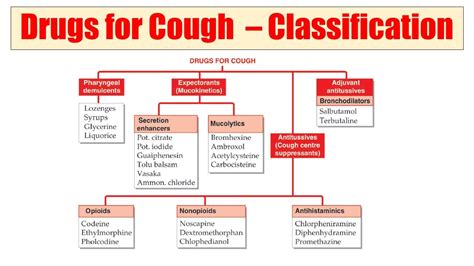
There are several types of cough medications available, each with its own unique mechanism of action and potential side effects. Expectorants, such as guaifenesin, work by increasing the amount of water in the airways, which helps to thin and loosen mucus. This makes it easier to cough up and can provide relief from congestion. Suppressants, such as dextromethorphan, work by reducing the frequency and severity of coughing. They do this by affecting the brain's cough center, which is responsible for regulating the cough reflex.
Expectorants
Expectorants are a type of cough medication that helps to thin and loosen mucus, making it easier to cough up. They work by increasing the amount of water in the airways, which helps to reduce the viscosity of mucus and make it more easily expelled. Expectorants are often used to treat coughs caused by respiratory infections, such as bronchitis and pneumonia. They can also be used to help relieve congestion and coughing caused by allergies and asthma.Suppressants
Suppressants are a type of cough medication that helps to reduce the frequency and severity of coughing. They work by affecting the brain's cough center, which is responsible for regulating the cough reflex. Suppressants are often used to treat coughs caused by viral infections, such as the common cold and flu. They can also be used to help relieve coughing caused by environmental irritants, such as smoke and dust.Over-the-Counter (OTC) Cough Medications
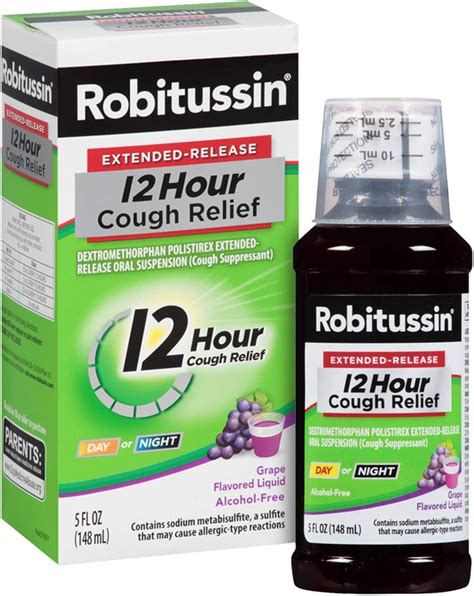
There are many OTC cough medications available, each with its own unique ingredients and potential side effects. Some common OTC cough medications include:
- Robitussin: This medication contains the expectorant guaifenesin and is often used to treat coughs caused by respiratory infections.
- Mucinex: This medication contains the expectorant guaifenesin and is often used to treat coughs caused by respiratory infections.
- NyQuil: This medication contains the suppressant dextromethorphan and is often used to treat coughs caused by viral infections.
- TheraFlu: This medication contains the suppressant dextromethorphan and is often used to treat coughs caused by viral infections.
Combination Products
Combination products are OTC cough medications that contain multiple ingredients, such as expectorants, suppressants, pain relievers, and decongestants. These products are often used to treat coughs caused by multiple factors, such as a cold or flu. Some common combination products include:- DayQuil: This medication contains the expectorant guaifenesin, the suppressant dextromethorphan, and the pain reliever acetaminophen.
- Advil Cold and Sinus: This medication contains the expectorant guaifenesin, the suppressant dextromethorphan, and the pain reliever ibuprofen.
Prescription Cough Medications
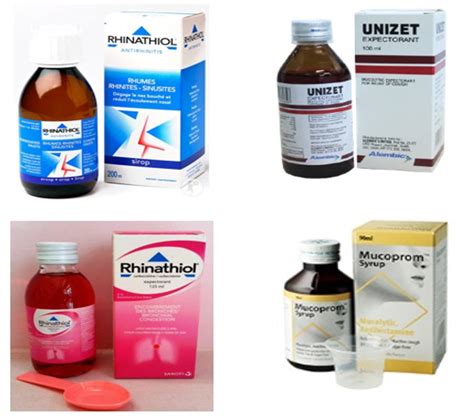
In some cases, a healthcare professional may prescribe a cough medication to help relieve symptoms. Prescription cough medications are often used to treat coughs caused by underlying medical conditions, such as COPD or pneumonia. Some common prescription cough medications include:
- Codeine: This medication is a suppressant that is often used to treat coughs caused by severe respiratory infections.
- Hydrocodone: This medication is a suppressant that is often used to treat coughs caused by severe respiratory infections.
- Morphine: This medication is a suppressant that is often used to treat coughs caused by severe respiratory infections.
Cough Medication Side Effects
Cough medications can cause a range of side effects, from mild to severe. Some common side effects of OTC cough medications include:- Drowsiness
- Dizziness
- Headache
- Stomach upset
- Constipation
Prescription cough medications can also cause side effects, including:
- Drowsiness
- Dizziness
- Headache
- Stomach upset
- Constipation
- Respiratory depression
Natural Remedies for Cough Relief

In addition to OTC and prescription medications, there are several natural remedies that can help to relieve cough symptoms. Some common natural remedies include:
- Honey: Honey has natural antibacterial and anti-inflammatory properties that can help to soothe a sore throat and reduce coughing.
- Lemon: Lemon has natural antibacterial and anti-inflammatory properties that can help to soothe a sore throat and reduce coughing.
- Ginger: Ginger has natural anti-inflammatory properties that can help to reduce inflammation and relieve coughing.
- Steam inhalation: Steam inhalation can help to loosen and clear mucus from the airways, reducing congestion and coughing.
Home Remedies
There are several home remedies that can help to relieve cough symptoms, including:- Drinking plenty of fluids, such as water and tea, to help thin and loosen mucus
- Using a humidifier to add moisture to the air and relieve congestion
- Avoiding irritants, such as smoke and dust, that can exacerbate coughing
- Getting plenty of rest to help the body recover from illness
Cough Prevention
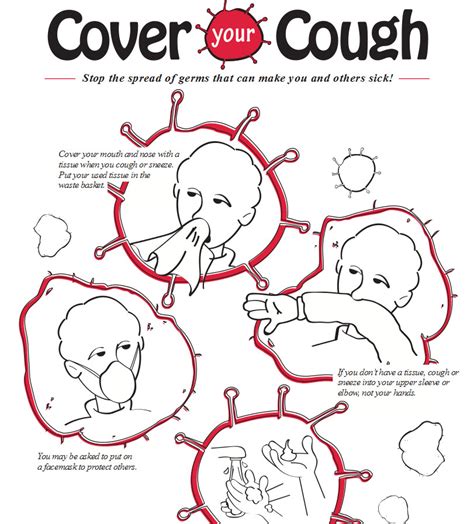
Preventing coughs is often easier than treating them. There are several steps that can be taken to reduce the risk of developing a cough, including:
- Getting vaccinated against common illnesses, such as the flu
- Practicing good hygiene, such as washing hands regularly and avoiding close contact with people who are sick
- Avoiding irritants, such as smoke and dust, that can exacerbate coughing
- Staying hydrated by drinking plenty of fluids
- Getting plenty of rest to help the body recover from illness
Cough Complications
In some cases, a cough can lead to complications, such as:- Pneumonia: A bacterial infection that can develop in the lungs and cause severe coughing and difficulty breathing.
- Bronchitis: An inflammation of the airways that can cause persistent coughing and difficulty breathing.
- COPD: A chronic lung disease that can cause persistent coughing and difficulty breathing.
Cough Diagnosis
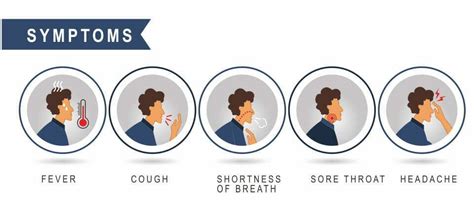
Diagnosing a cough involves a physical examination and medical history. A healthcare professional will typically ask questions about the cough, such as:
- When did the cough start?
- How long has the cough lasted?
- What are the symptoms of the cough?
- Has the cough been treated with any medications or remedies?
A physical examination may also be performed to check for signs of illness, such as a fever or difficulty breathing.
Cough Treatment
Treating a cough depends on the underlying cause and severity of the symptoms. In some cases, a cough may be treated with OTC or prescription medications. In other cases, a cough may be treated with natural remedies or home remedies.It is essential to consult a healthcare professional to determine the best course of treatment for a cough. They can provide a proper diagnosis and recommend the most effective treatment options.
What is the best medication for cough relief?
+The best medication for cough relief depends on the underlying cause of the cough, its severity, and the individual's overall health. Over-the-counter (OTC) medications, such as expectorants and suppressants, can help to relieve cough symptoms. Prescription medications, such as codeine and hydrocodone, may be prescribed for more severe coughs.
How can I prevent a cough?
+Preventing a cough is often easier than treating it. Getting vaccinated against common illnesses, practicing good hygiene, avoiding irritants, staying hydrated, and getting plenty of rest can help to reduce the risk of developing a cough.
What are the complications of a cough?
+In some cases, a cough can lead to complications, such as pneumonia, bronchitis, and COPD. It is essential to consult a healthcare professional if symptoms persist or worsen over time.
In summary, coughing is a natural reflex that can be uncomfortable and disrupt daily life. There are many OTC and prescription medications available to help relieve cough symptoms, as well as natural remedies and home remedies. Preventing coughs is often easier than treating them, and consulting a healthcare professional can help to determine the best course of treatment. We hope this article has provided you with valuable information on the best medication for cough relief. If you have any further questions or concerns, please don't hesitate to comment below or share this article with others who may find it helpful.
